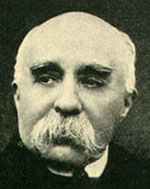Approaching History
DifficultiesSome difficulties are to be solved by pushing ahead; it is here that the skill of the individual counts for much. The classic metaphor is that of the cook in Jwangdz 3:1, from about the year 0270.
Cook Ding was cutting up an ox for Lord Wvn-hwei. The reach of his arm, the shift of his shoulder, the tread of his foot, the lean of his knee - so warily, so guidingly, he plied his knife so slidingly; not a note was out of tune. It could have been a "Mulberry Grove" dance; it would have suited a "Boar's Head" performance.
Lord Wvn-hwei said, "Excellent! Good indeed! Can skill really attain to such perfection?"
Cook Ding sheathed his knife and replied, "What your servant loves is the Way; it goes beyond mere skill. When your servant first began cutting up oxen, everything he saw was an ox. After three years, he no longer saw a whole ox. And at the present time, your servant encounters the ox with his spirit, he does not observe it with his eyes. Where the senses reach their limit, the spirit carries on as it will, in accord with natural logic: along the large contours, through the large openings, following the line of least resistance. The smallest bit of tendon I have never attempted; how much less any solid bone? A good cook changes his knife yearly: he cuts. An ordinary cook changes his knife monthly: he hacks. Your servant's knife is going on for nineteen years, and has cut up thousands of oxen, but the edge of the blade is as sharp as if it were fresh from the whetstone. At the joints, there is always some space, and the edge of the blade has no thickness. If one inserts what has no thickness into what has some space, ever so carefully, there will always be more than enough room for the moving blade. It is in this way that after nineteen years the edge of the blade is as sharp as if it were fresh from the whetstone."
"Even so, when I come to a tight place, I see the difficulty; I proceed carefully. My gaze is fixed, my motions are slow, I move the knife ever so slightly - and then all at once, it is cut through, like earth crumbling to the ground. I withdraw my knife and stand erect. I look all around me; I linger there until I am fully satisfied. And then I put my knife in good order, and store it away."
That is a counsel of mastery. And how do you acquire mastery? Mainly, by keeping going. Here is one of the famous descriptions in the literature, from a memoir by a student of Agassiz:
I had assigned to me a small pine table with a rusty tin pan upon it . . . When I sat me down before my tin pan, Agassiz brought me a small fish, placing it before me with the rather stern requirement that I should study it, but should on no account talk to anyone concerning it, nor read anything relating to fishes, until I had his permission to do so. To my inquiry, What shall I do, he said in effect, "Find out what you can without damaging the specimen; when I think that you have done the work, I will question you." In the course of an hour I thought I had compassed the fish; it was rather an unsavory object, giving forth the stench of old alcohol . . . It appeared to me to be a case of a summary report, which I was anxious to make and get on to the next stage of the business. But Agassiz, though always within call, concerned himself no further with me that day, nor the next, nor for a week.
At first this neglect was distressing, but I saw that it was a game, for he was . . . covertly watching me. So I set my wits to work upon the thing, and in the course of a hundred hours or so thought I had done much - a hundred times as much as seemed possible at the start. I got interested in finding out how the scales went in series, their shape, the form and placement of the teeth, etc. Finally I felt full of the subject and probably expressed it in my bearing: as for words about it then, there were none from my master except his cheery "Good morning."
At length, on the seventh day, came the question, "Well?" and my disgorge of learning to him as he sat on the edge of the table, puffing his cigar. At the end of the hour's telling he swung off and away, saying "That is not right."
It was clear that he was playing a game with me to find if I were capable of doing hard, continuous work without the support of a teacher, and this stimulated me to labor. I went at the task anew, discarded my first notes, and in another week of ten hours a day labor I had results which astonished myself and satisfied him.
Just keeping going, and with extra care and attention when one seems to have reached a difficult place, is part of the technique of keeping going.
Devices
But not the whole. There you are, back in Whatever Century, up against a lot of facts or observations that so far don't make sense. You have modified your question, or let the data suggest one for you, but you still don't see your way clear to the answer. Something else is needed. Is there anything you can do?
Not necessarily. But there are standard devices that have worked in more than one situation, and it may be good to know what they are. Here are a few of them.
- Focus. The clarifying question of Clemenceau ("What exactly is the problem here?") should be asked of the work at hand, every morning. How far are you? What do you need, and is there any chance of getting it? Is there something else you could do with what you have?
- Draw a Picture. Graphing the data is one way of seeing what the relations may be among the data, or what further data may be needed. Agassiz said approvingly to the student who had begun to draw his assigned dead fish: "Good; a pencil is one of the best eyes." True enough. And a list of numbers can be one of the best ears.
- Chronologize. Things make much more sense when arranged in the order in which they probably happened. Obvious, and hence often neglected. Do it.
- Bring in a Parallel. Much light can be shed on a chronologically ordered set of biographical data by lining up beside it a set of government policy data from the same period. You may find that someone whose work you admire (like Gini or Tucci) turns out to have been closely involved in widely disapproved events (the Mussolini regime). Here is where the courage that von Ranke recommends, the courage to face the result, comes in handy. Your reward, as usual in these things, is not that you like it better, but that you understand it better.
- You can't get there from here. But you could from OVER THERE, and you can see a way of getting OVER THERE. This is the device of the intermediate step, what mathematicians call a lemma. If the intermediate step is itself publishable, as often happens, all the better. And if somebody else takes the next step from your lemma, well, part of the credit is permanently yours.
- Turn it the other way. As Jacobi said, "One must always invert." Ask the question from the other direction. Substitute data for quaesita. See Bell 325 on the momentous breakthrough of Abel in the matter of elliptic integrals. If you are stymied in figuring out causes of Y, look at possible effects of X. If you can't locate forgiveness, in the culture you are studying, look instead at possible reasons why you are not finding it.
No Devices
These are some ways of not getting stuck. But there is also a time to admit that you are stuck; a time to give up. Spend your limited life on something with a higher probability of valuable results. Ponder the pitiful case of Einstein and the unified field theory. The right data may not be there to think about, or the right concepts may not be there to think about them with. Einstein was a good thinker, but the world's worst strategist of thinking. Continued thinking under impossible conditions is foolish. You cannot count on being born into just that age of the world in which some particular problem comes up for solution.
Heaven is on your side, but maybe not that much.
Persistence is a virtue, but only in certain circumstances. Knowing when persistence is a virtue, and when it is a misdirection of resources, is part of being good at problems. Sensing when they can't be solved is the flip side of sensing where they can. We need both sides of the coin.
Readings
- Houston Peterson. Great Teachers. The memoir of Agassiz by Shaler is the last one in the book.
- George Polya. How to Solve It. Reduces problem-solving and problem-attacking in geometry to a general system. One of the immortal classics of the subject.
17 Mar 2006 / Contact The Project / Exit to Outline Index Page



